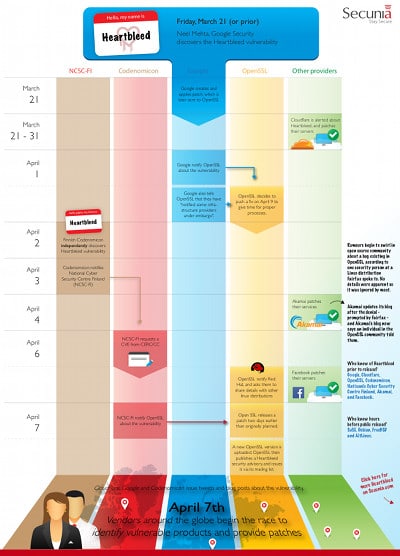A four year-old vulnerability in an open source component that is a critical part of Google’s Android mobile operating system could leave mobile devices that use it susceptible to attack, according to researchers at the firm Bluebox Security. The vulnerability was disclosed on Tuesday. It affects devices running Android versions 2.1 to 4.4 (“KitKat”), according to a statement released by Bluebox. According to Bluebox, the vulnerability was introduced to Android by way of the open source Apache Harmony module. It affects Android’s verification of digital signatures that are used to vouch for the identity of mobile applications, according to Jeff Forristal, Bluebox’s CTO. He will be presenting details about the FakeID vulnerability at the Black Hat Briefings security conference in Las Vegas next week.
OpenSSL
Google Unveils Project Zero Hacking Team
Google has unveiled an all-star team of hackers and security researchers it is calling “Project Zero.” According to a post on Google’s security blog, the company is hoping to use its security research muscle to investigate the security of “any software depended upon by large numbers of people, paying careful attention to the techniques, targets and motivations of attackers.” Research like Google employee Neel Mehta’s, which helped expose the “Heartbleed” vulnerability in OpenSSL is a good example of the kinds of stuff Project Zero will do. Researchers will devote their time to finding and reporting software vulnerabilities and researching new exploits, mitigations and “program analysis.” The company said it plans to disclose any vulnerabilities it finds to the vendor first, then to the public in an external database. The public can monitor “time to patch” (given that the vulnerability is disclosed ahead of a patch). Project Zero brings Google’s elite hackers under […]
Infographic: A Heartbleed Disclosure Timeline (Secunia)
The dangerous security hole in OpenSSL known as “Heartbleed” has (mostly) faded from the headlines, but that doesn’t mean it isn’t still dangerous. As this blog has noted, the Heartbleed vulnerability was patched quickly on major platforms like Apache and nginx and by high profile service providers like Google and Facebook. But it still has a long tail of web applications that aren’t high risk (i.e. directly reachable via the Internet) and embedded devices that use OpenSSL or its various components. As the folks over at Acunetix note in a blog post today, hundreds of other services, application software and operating systems make use of OpenSSL for purposes that might be entirely unrelated to delivering pages over HTTPS. This includes all the email servers (using SMTP, POP and IMAP protocols), FTP servers, chat servers (XMPP protocol), virtual private networks (SSL VPNs), and network appliances that use OpenSSL or its components. The number of systems vulnerable to […]
Heart Attack? Fixes For More Critical Holes In OpenSSL
Just a month after a critical security hole in OpenSSL dubbed “Heartbleed” captured headlines around the globe, The OpenSSL Foundation has issued an other critical software update fixing six more security holes, two of them critical. The Foundation issued its update on Thursday, saying that current versions of OpenSSL contain vulnerabilities that could be used to carry out “man in the middle” (or MITM) attacks against OpenSSL clients and servers. SSL VPN (virtual private network) products are believed to be especially vulnerable. Users of OpenSSL versions 0.9.8, 1.0.0 and 1.0.1 are all advised to update immediately. According to information released by the OpenSSL Foundation, an attacker using a carefully crafted handshake can force the use of “weak keying material in OpenSSL SSL/TLS clients and servers.” That could lay the groundwork for man-in-the-middle attacks in which an attacker positions herself between a vulnerable client and server, decrypting and modifying traffic as it passes through the attacker’s […]
Podcast: Is Defense-In-Depth The Only Real Heartbleed Fix?
Like everyone else, we wrote extensively in the last month about the serious security vulnerability in OpenSSL dubbed “Heartbleed,” which affected many of the world’s leading web sites and services, including Facebook and Google. The large-type headlines about Heartbleed have passed. But that doesn’t mean that the danger has. As we have noted, we are entering a phase that might be considered Heartbleed’s ‘long tail.’ Most of the well-trafficked websites that were vulnerable to Heartbleed have gotten around to fixing the vulnerability. But public-facing web servers are only the beginning of the story for OpenSSL. Chasing down the vulnerability’s long tail in third-party applications and on internal web sites and applications is a much larger task. As I’ve noted: open source components make their way into all manner of applications and bespoke products these days, often without any effort to assess the security of the borrowed code. For companies that need to protect critical IT […]





